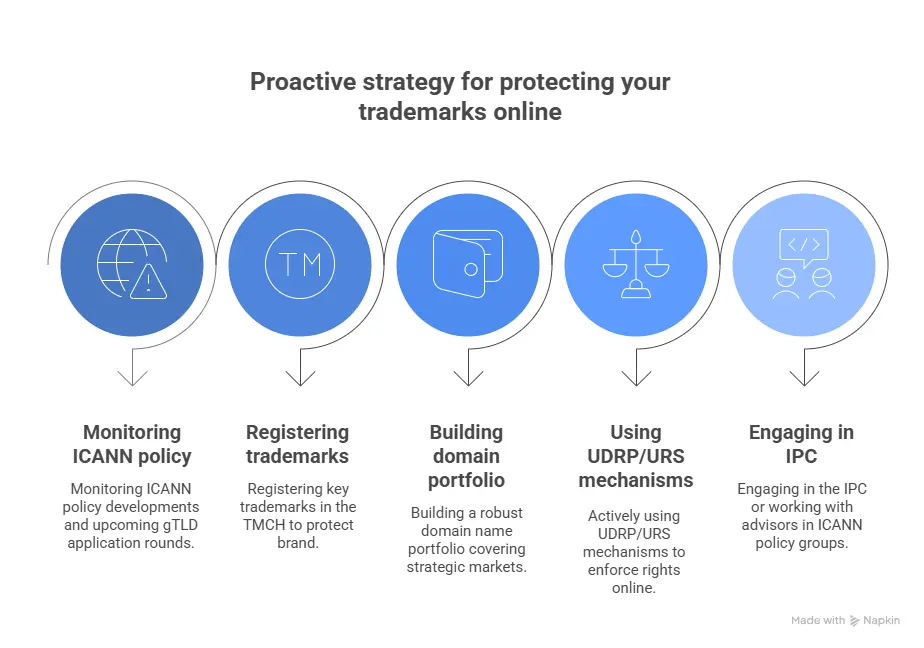Sommaire
Introduction
For trademark owners and intellectual property professionals, the Internet Corporation for Assigned Names and Numbers (ICANN) plays a crucial yet often underestimated role in the protection of digital assets. As the central body coordinating the global Domain Name System (DNS), ICANN develops policies and implements dispute resolution mechanisms that are essential tools in combating cybersquatting, protecting trademarks, and preserving the online reputation of businesses.
Understanding ICANN’s role and knowing how to engage in its decision-making processes has become indispensable for any organization seeking to safeguard its digital identity in a constantly evolving environment.
The role of ICANN in the Internet ecosystem
Founded in 1998, ICANN is a non-profit organization responsible for coordinating the management of databases related to Internet naming spaces and digital addresses. Its main functions include:
- Managing the root of the DNS system;
- Accrediting registrars and authorizing registries;
- Defining policies governing generic top-level domains (gTLDs) such as .com, .org or .xyz, as well as brand extensions (e.g., .loreal);
- Administering dispute resolution policies such as the Uniform Domain Name Dispute Resolution Policy (UDRP) and the Uniform Rapid Suspension (URS) system.
ICANN does not regulate the content available on the Internet. Its role is to ensure that each domain name is unique, that the DNS remains reliable, and that the global ecosystem operates in a stable and secure manner.
Why ICANN is essential for trademark owners and IP professionals
UDRP and URS procedures
The UDRP provides a global and relatively cost-effective mechanism for recovering domain names registered in bad faith. The URS, while faster but limited to the temporary suspension of an infringing domain name, complements the enforcement arsenal. Together, these procedures remain indispensable tools in the fight against cybersquatting.
The Trademark Clearinghouse (TMCH)
The TMCH is a centralized database where trademark owners can record their rights. This allows them to:
- Receive alerts in case of attempted registrations of similar names during the launch of new gTLDs;
- Benefit from priority access (Sunrise period) to secure domain names corresponding to their marks before the extension opens to the public.
Brand TLDs and the new wave of gTLDs
The expansion of gTLDs, including brand TLDs (e.g., .google, .sky, .canon), offers companies the opportunity to control their own digital space and reinforce consumer trust. The upcoming application round, expected in the coming years, will require anticipation and well-defined strategy.
WHOIS data and access to registration information
Since the General Data Protection Regulation (GDPR) came into force, public access to WHOIS data has been severely restricted. ICANN is currently developing the Registration Data Request Service (RDRS) to regulate access requests. For rights holders, monitoring and contributing to these discussions is vital, as access to registration data remains a key condition for enforcing trademark rights.
Participation in ICANN’s multistakeholder model
ICANN operates under a multistakeholder governance model, where governments, businesses, technical experts, and civil society all contribute to policy development. Rights holders’ interests are primarily represented within the Business Constituency (BC) and the Intellectual Property Constituency (IPC) of the Generic Names Supporting Organization (GNSO). These groups:
- Advocate for balanced policies that respect trademark rights;
- Influence the development of new dispute resolution mechanisms;
- Participate in the review of domain name policies and registry agreements.
Active involvement in these forums enables businesses to directly influence decisions that impact trademark protection and DNS governance.
Strategic implications for corporate digital policy
For businesses, particularly those with a global presence or exposure to imitation, ICANN policies are not abstract governance issues but practical tools. A proactive strategy should include:
- Monitoring ICANN policy developments and upcoming gTLD application rounds;
- Registering key trademarks in the TMCH;
- Building a robust domain name portfolio covering strategic markets;
- Actively using UDRP/URS mechanisms to enforce rights;
- Engaging in the IPC or working with advisors who participate in ICANN policy groups.
ICANN is more than a technical body: it is a global forum where the future of Internet naming infrastructure is shaped. For businesses seeking to protect their brand identity and minimize digital risks, proactive participation in ICANN processes is no longer optional, it is an essential component of modern IP management.
At Dreyfus & Associés, we understand the pivotal role ICANN plays in managing the global domain name system and safeguarding digital assets. As businesses face growing challenges in cybersquatting, trademark infringement, and brand protection in the digital space, our firm provides tailored expertise to help you navigate ICANN’s complex policies and ensure compliance with international digital standards.
Dispute resolution
We guide you through UDRP and URS procedures to recover or suspend domain names registered in violation of your rights.
Digital trademark protection
We handle trademark registrations in the TMCH and advise on opportunities to apply for a brand TLD, particularly with the next application round expected in 2026.
Data access and compliance
We assist you in using the RDRS and in requesting WHOIS data access, ensuring compliance with GDPR.
Strategic representation
As an active member of the IPC, our firm represents your interests in ICANN discussions and helps you prepare public comments to influence future policies.
Comprehensive digital strategy
We monitor ICANN developments on your behalf, optimize domain portfolio management, and prepare you for Universal Acceptance (UA), a key condition for an inclusive and effective digital presence.
Conclusion
At Dreyfus, we provide comprehensive legal and strategic advice to businesses navigating ICANN’s complex systems, from domain name dispute resolution to trademark protection and IP enforcement. Whether you are dealing with domain name recovery, new gTLDs, or compliance with WHOIS data access regulations, Dreyfus is here to guide you.
For expert legal advice on ICANN-related matters, contact Dreyfus & Associés. Our experienced team is dedicated to safeguarding your digital presence and intellectual property rights in today’s constantly evolving online environment.
Dreyfus Law firm assists its clients in managing complex intellectual property cases, offering personalized advice and comprehensive operational support for the complete protection of intellectual property.
Dreyfus Law firm is partnered with a global network of lawyers specializing in intellectual property.
Nathalie Dreyfus with the assistance of the entire Dreyfus team.
FAQ
1. What is ICANN’s role in trademark-related disputes?
ICANN administers specialized mechanisms such as the UDRP (Uniform Domain Name Dispute Resolution Policy) and the URS (Uniform Rapid Suspension System). These procedures allow trademark owners to recover or suspend domain names registered and used in bad faith, without resorting to national courts.
2. How can a trademark owner protect rights during the launch of new gTLDs?
By registering trademarks in the Trademark Clearinghouse (TMCH), rights holders receive early alerts and enjoy priority access to corresponding domain names during the Sunrise period, securing their rights before general availability.
3. Can ICANN help identify domain name holders after the GDPR?
Indirectly. Since WHOIS data access has been restricted, ICANN has launched the Registration Data Request Service (RDRS), which enables rights holders and authorities to request access to registration data in a GDPR-compliant framework.
4. What are brand TLDs and why do they remain strategic?
Brand TLDs (e.g., .canon, .gucci) are Internet extensions reserved and operated by companies to fully control their naming space. They ensure secure, coherent, and value-enhancing communication around the brand. Their relevance remains intact as the next wave of gTLD applications approaches.
5. How can a business or law firm engage with ICANN’s work?
Participation is possible through the Business Constituency (BC) or the Intellectual Property Constituency (IPC), two influential groups within ICANN. Businesses and advisors may also contribute directly by responding to ICANN’s regular public consultations.


